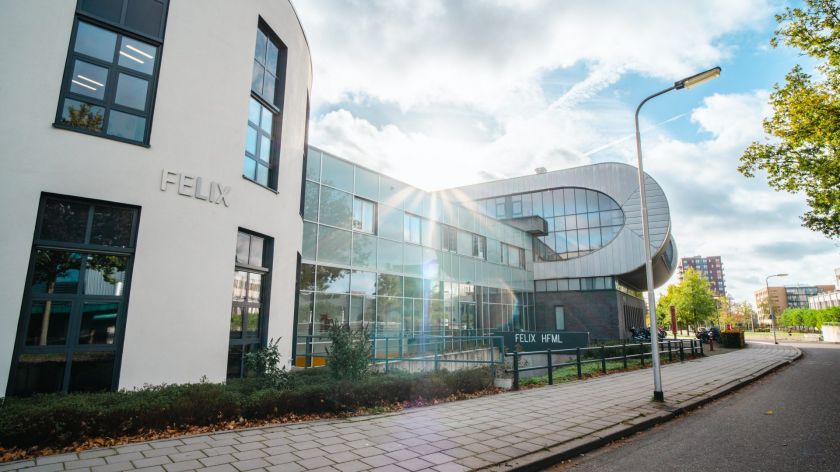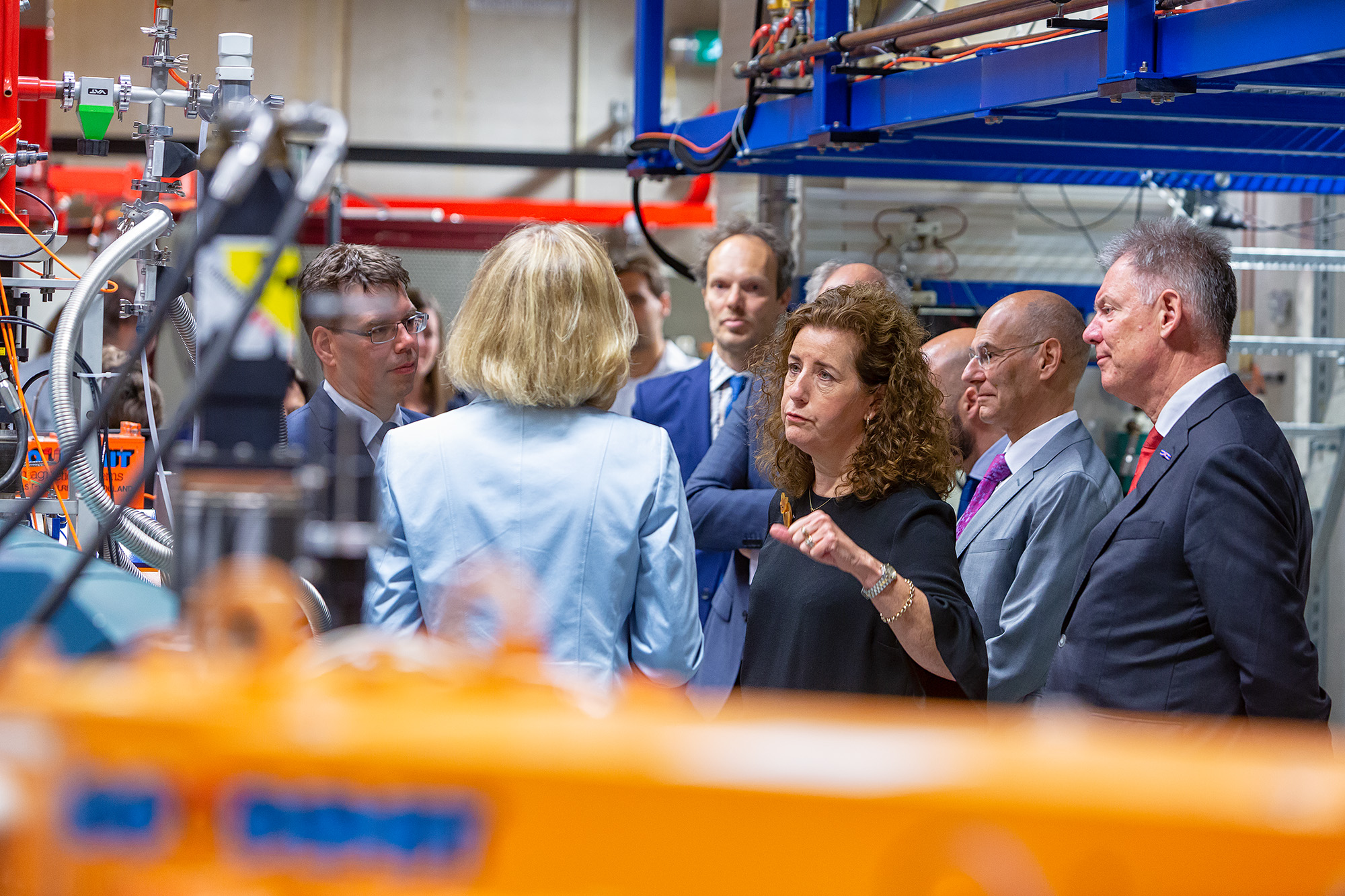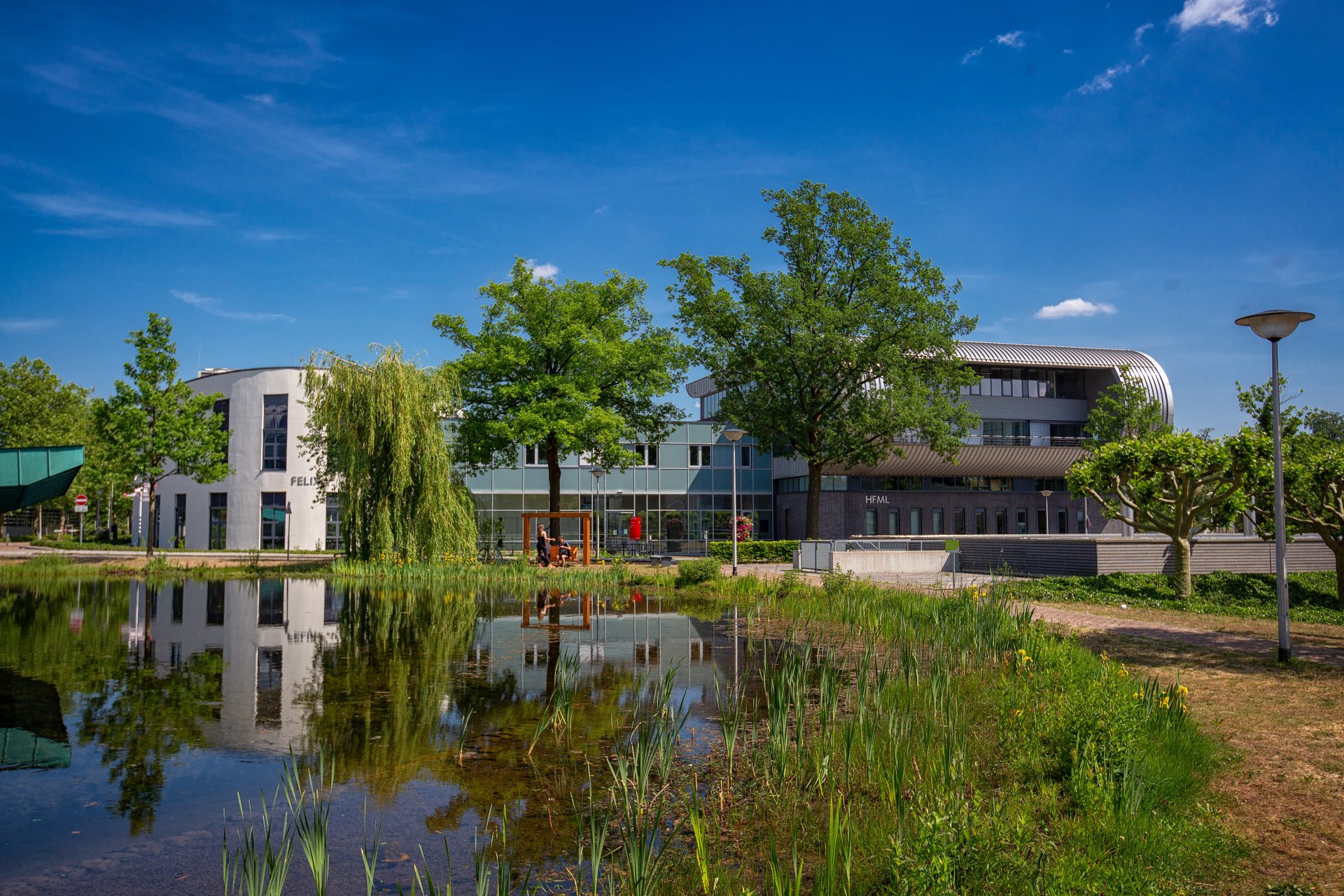Millions in shortfall for magnetics and laser lab HFML-FELIX; staff struggling with high workload
-
 Onderzoek in HFML-FELIX droeg bij aan de Nobelprijs voor Andre Geim. Foto: Johannes Fiebig
Onderzoek in HFML-FELIX droeg bij aan de Nobelprijs voor Andre Geim. Foto: Johannes Fiebig
The prestigious magnetics and laser lab HFML-FELIX is finding itself in serious financial trouble. Negotiations between the scientific funding provider — the Dutch Research Council (NWO) — and Radboud University have not led to anything as of yet. The financial uncertainty has led to a high workload amongst the staff.
There is a problem with the funding for the magnetics and laser lab HFML-FELIX, originally two separate labs combined into one in 2019. Since the founding of magnetics lab HFML in 2003, Radboud University and scientific funding provider NWO have each taken on half of the burden, but two long-term contracts with the latter party came to an end: one on 1 January 2022 and the other on 1 January 2023.
Negotiations for new funding between Radboud University and NWO are still under way. Dean of the Radboud’s Faculty of Science (FNWI), Sijbrand de Jong, is unable to say why previous discussions with NWO haven’t led to anything. ‘That concerns the internal NWO situation.’
But how soon can we expect a solution? ‘I’d say that we’ll make a lot of progress this calendar by developing a solution,’ says the dean. ‘But I said that last year around this time too.’
In transition
While a solution is still in the works, the lab is being funded with money from Radboud University’s Faculty of Science. The deficit is so high that the faculty as a whole is expected to experience losses in the upcoming year. De Jong won’t say how just how much the anticipated shortfall will be, but tells us that it’s in the millions.
‘We are confident that the funding will find its way here’
University spokesperson Martijn Gerritsen confirms that even Radboud’s Executive Board is making adjustments. He is not able to indicate how much money is involved or how long the Executive Board will continue to operate like this. ‘This is a transitional period towards structural funding,’ says Gerritsen.
He tells us that HFML has been able to develop into an internationally renowned research facility thanks to roadmap grants. ‘Research facilities like this in the Netherlands are funded via grants,’ he says. ‘This means that, once a grant runs out, you have to seek out new funding again and again. That’s a problem.’
Nikhef and DIFFER
De Jong says that NWO and Radboud University agree on their need to arrive at a solution to funding HFML-FELIX together. ‘NWO will assume responsibility for structurally resolving the situation,’ he says.
The dean tells us that the faculty is working towards a collaboration in which HFML and FELIX are each housed at an NWO institute and the Faculty of Science, split evenly between both organisations, with the financial burden being equally shouldered as well. In a structure like that, HFML-FELIX would become a national NWO institute, such as the sustainable energy lab DIFFER in Eindhoven or Amsterdam’s Nikhef, a particle-physics research institute. ‘But NWO still needs some convincing,’ says De Jong.

Radboud University’s Executive Board considers this type of national institute to be a potential solution as well. ‘Radboud University and NWO are exploring how long-term funding can be organised,’ says Gerritsen. ‘That concerns roughly 8 million euros per year. Given how significant this unique research facility is to science, the Executive Board is confident that the funding will find its way here.’
An NWO spokesperson confirms that the scientific funding provider is in discussions with the magnetics and laser lab about the future. ‘HFML-FELIX is certainly an important institute for the exact sciences.’ In her words, it would be ‘desirable’ to strengthen the role of the labs and adapt them to demand in the field. The spokesperson tells us that discussions on the matter are in full swing and that it is too early to predict the results. ‘We expect to have a clearer view on the matter come summer.’ The NWO spokesperson also says that the big hurdle is finding the right format and structural funding for it all.
High workload
The precarious financial situation has had an impact on the work floor as well, resulting in a high workload. Shortly before the summer, dozens of HFML-FELIX staff members asked to have a discussion with union representatives from the FNV (the Dutch trade union association). Around Christmas, there was a second discussion with seven staff members in attendance. ‘The people were not happy: they felt that pressure at work was high and appreciation was lacking,’ says Sander Wesdorp, director of Education & Research at the FNV.
‘Hiring more staff is not the answer right now’
Dean De Jong says that the workload in the labs is high, which is partly due to a shortage of available staff. After all, only 20% of the magnetics lab users work at Radboud University; the other users are scientists from Europe and other parts of the world. They don’t have to pay to use the system, but still receive guidance and assistance from PhD candidates and postdocs. In turn, the PhD candidates and postdocs spend their time, which they would otherwise use to conduct research, on explaining complex research equipment.
High energy costs
Some of the magnets at the HFML lab have the highest field strengths in the world. That also means they come with high energy costs. ‘But if this lab unravels the mysteries behind superconductivity one day, that will play a part in reducing energy costs for all of mankind,’ says Dean Sijbrand de Jong.
Research at HFML has already led to a big scientific breakthrough in the past. The Nobel Prize-winning discovery of graphene by Andre Geim and Konstantin Novoselov in 2010 was partly due to research at the magnetics lab. ‘It is a flagship for the faculty, the university, and the Netherlands as a whole,’ says De Jong.
De Jong says that this problem is now understood and being addressed. They are currently in the process of reducing the workload. De Jong declines to go into greater detail: ‘Hiring more staff is not the answer right now,’ he says. FNV Director Wesdorp says he has confidence in the steps that have been taken by management to resolve this. ‘We will follow up on it.’
‘This really hurts: it’s no small deficit. We’re talking millions’
The staff members are having problems other than the workload. De Jong confirms that departing HFML professors are difficult to replace, which was mentioned in the reports on the faculty joint assembly. ‘Each individual situation is different, of course, but it is tough to bring people in when there are no clear future prospects.’
Millions
University spokesperson Martijn Gerritsen tells us that as long as negotiations with NWO are ongoing, they will save on the ‘technology-development’ programme. They will also look into the cost of operations, which may translate to fewer hours made available to external researchers at the magnetics lab. Gerritsen says that there will be no direct effect on employee salaries or the number of positions.
This begs the question of what would happen if NWO chose not to contribute to HFML-FELIX in the future. ‘If we can’t find a solution, that doesn’t mean the university will just let HFML-FELIX fall by the wayside,’ says De Jong. ‘I’ve told the staff that too. But this really hurts: it’s no small deficit. We’re talking millions.’
Translated by Radboud in’to Languages




